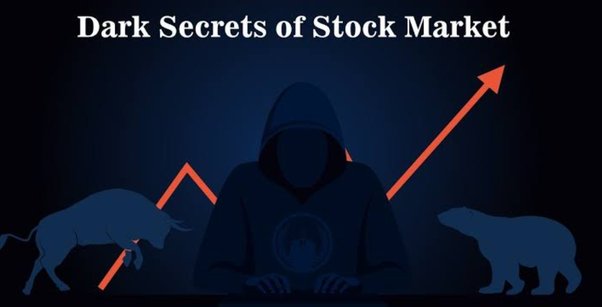Millions of global investors flock to the stock market, sometimes lauded as a haven of riches and opportunity. It’s a place where fortunes are built, and dreams are realised, but beyond the gleaming exterior lurks a world of secrets and hidden facts that few are ready to address publicly. This article will go into The Dirty Stock Market Secrets, illuminating the financial world’s darker elements. This investigation will disclose dirty stock market secrets.
1. Insider Trading: The Silent Manipulator
Insider trading is one of the stock market’s most well-known yet little-discussed mysteries. When people with privileged access to sensitive information about a firm exchange its stocks for personal advantage, this is known as insider trading. Because of this unlawful practice, these people get an unfair edge over regular investors, resulting in market manipulation and a tilted playing field.
Although regulators are continuously attempting to curb insider trading, the truth is that it continues to occur in the shadows, threatening market integrity and undermining investor trust.
2. Pump and Dump Schemes: A Modern-Day Swindle
Pump-and-dump scams are another dark secret that may fool even the most experienced investors. In this fraudulent practice, manipulators artificially increase the price of a stock (pump) to entice novice investors by disseminating incorrect or misleading information. Once the stock price reaches a high point, the culprits sell their shares (dump), causing the price to plummet and investors to suffer huge losses.
With the introduction of social media, pump-and-dump schemes have gotten more complex, making it difficult for authorities to identify and prohibit such fraudulent activity efficiently.
3. Dark Pools: Hidden from the Public Eye
Dark pools are covert trading platforms that allow large institutional investors to exchange sizable blocks of securities without the public’s knowledge. While they serve a function by providing major players with liquidity and anonymity, they also raise issues about market transparency. Because dark pool transactions are not published in real-time, they can alter public perceptions of a stock’s genuine demand and supply, hurting overall market efficiency.
4. High-Frequency Trading (HFT): The Speed Advantage
High-frequency trading, or HFT, is a way of dealing that uses powerful computers and programs to make a lot of deals very quickly. HFT companies profit from small price gaps and short-lived market chances, hurting average investors.
The 2010 Flash Crash, in which wrongly automated trading led the Dow Jones Industrial Average to drop almost 1,000 points in minutes, shows that the extreme speed of HFT also makes people worry about the market’s security.
5. Market Manipulation: The Puppeteers
Market manipulation may take many forms, from propagating false rumours to inflating or deflating stock values. While restrictions are in place to prohibit such actions, cunning manipulators continue to locate and exploit loopholes. The lack of transparency and the complexity of financial systems make it difficult to apprehend and punish those guilty adequately.
6. Ponzi Schemes: The Wolf in Sheep’s Clothing
Although not directly tied to the stock market, Ponzi schemes sometimes interact with investing circles. Ponzi schemes entice naive participants who inadvertently fund returns for previous investors by promising hefty returns with little or no risk. When the plan eventually fails due to an unsustainable structure, numerous people lose their hard-earned money.
7. Front-Loaded Mutual Fund Fees: A Hidden Handicap
Mutual funds are popular investment instruments that enable people to combine their money and invest in a professionally managed, diversified portfolio. Some mutual funds, however, include upfront fees known as “sales loads.” These fees are assessed at the time of acquisition of the mutual fund and may drastically reduce the original investment.
Front-loaded mutual fund fees are an unnoticed disadvantage that might reduce long-term gains. While some financial advisers may not openly disclose or discuss these charges, investors should be aware of them and examine their influence on their investment performance.
8. Window Dressing: Misleading Appearances
Some fund managers use window dressing to deceive investors, particularly towards the conclusion of a reporting period. Fund managers may acquire more of the best-performing companies or sell off failing ones just before the reporting period closes to create the appearance of high performance.
Fund managers want to attract new investors or keep current ones by displaying a portfolio of top-performing equities. This practice, however, does not represent the fund’s underlying investing strategy or long-term performance, offering a skewed image of its actual risk and return profile.
9. Unregulated Cryptocurrency Markets: A Playground for Scams
The development of cryptocurrencies has created a new industry that is mainly unregulated and very volatile. While cryptocurrencies have grown in popularity as an alternative investment, their lack of government control creates an environment conducive to fraud and fraud.
In the cryptocurrency arena, pump-and-dump scams are expected, in which promoters artificially raise the price of a digital asset through false hype and misleading information, only to sell their holdings and collapse the market later, leaving unwary investors with substantial losses.
Furthermore, the lack of stringent rules has resulted in several Initial Coin Offering (ICO) scams in which bogus organisations gather cash from investors by promising new technologies but delivering nothing of value.
Conclusion
In conclusion, The Dirty Stock Market Secrets is undoubtedly an essential engine of economic growth and prosperity, but it’s necessary to acknowledge its darker underbelly. The dirty secrets of the stock market, from insider trading to pump and dump schemes, dark pools, high-frequency trading, market manipulation, Ponzi schemes, front-loaded mutual fund fees, window dressing, and unregulated cryptocurrency markets, paint a picture of a complex and sometimes manipulative financial ecosystem. Understanding and addressing The Dirty Stock Market Secrets is crucial for creating a more transparent and fair economic landscape.




